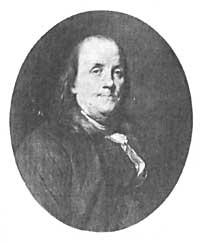Benjamin Franklin
Elhuyar Fundazioa
This American scientist and politician was born on January 17, 1706 in Boston, capital of the state of Massachusetts. In 17 brothers was number fifteen and throughout his life he worked in numerous trades, being a writer, printer, politician, diplomat and scientist.
He made a series of inventions in improving stoves and bifocal glasses, but the most important scientific advances introduced them into electricity. Static electricity was a fascinating phenomenon, the XVII. In the eighteenth century the German physicist Otto von Guericke manufactured the first electric friction machine. In 1745 the University of Leyden in Colorado devised a special boat. It was a glass container lined inside with metal and with a metal barrel in the center. In the internal metal lining, many electrical loads generated by the friction machine were collected and if someone touched the central bar, the shock of the discharge was not forgotten for a few days. When Leyden's container was approached by some metal, a small spark with a small noise in the air was also skipped.

Many scientists were rehearsing with Leyden's ship, but Franklin came up with a curious idea. He thought that that spark and the noise of the air was only a ray and a small thunder. Was the exchange of electric charges between Earth and clouds on a huge Leyden ship not a celestial ray and a thunder?
Benjamin Franklin made a special essay in 1752, a day of storm. He released a comet and kept it high in the air with a silk thread. The comet had at the top a tip wire and if there was electricity in the sky, attracted by that wire, the comet would be loaded. At the bottom end of the silk thread, the kite had a metallic grip and when Franklin approached the hand the spark was jumped like on Leyden's boat.
Franklin’s comet surprised people and thanks to his essay he became a member of the “Royal Society”. Two other scientists treated comet like Franklin during storms, but unfortunately both died affected by lightning. Franklin had a great fortune because he did not know that his performance was so dangerous.
However, in 1747, Franklin observed that Leyden's ship was discharged more easily if the sharp piece approached the central barrel. It seemed that the tip attracted electric charges. Thus, by placing sharp bars on the rooftops of the houses and connecting them to the ground, electrical loads (lightning) could be carried to the ground in the clouds without the buildings being risky.
Franklin obtained good results with the use of the “lightning rods” and in 1782 in the four hundred buildings of Philadelphia were placed the lightning rods.
In Franklin's time they knew there were two types of electricity. When rubbing two bars of amber they are electrified and repel. The same happens with two glass bars. But the bars of electrified amber and glass do not repel, but they are attracted. Franklin explained this phenomenon by saying that electricity was missing or surplus from a fluid. The piece with excess fluid could attract the missing one and the two electrifications could be neutralized.
Franklin noted that excess fluid should be called positive electricity and lack of negative electricity. Today electricity is expressed by subatomic particles (and especially by electrons) and we know that the positive electricity of Franklin is the lack of electrons. The electrician considers that in the circuits the electric current goes from positive to negative borne, but the physical knows that the electrons have the reverse way.
Benjamin Franklin also studied American storms. The Gulf hot water current in the northern Atlantic, for example, was the first to study it.
He participated as a politician and diplomat in the creation of the United States. As the North American colonies separated from Britain, Franklin contributed to writing the Declaration of Independence. In 1776 he came to France as a diplomat asking for military and financial aid in favor of the colonies.
Benjamin Franklin died on April 17, 1790 in Philadelphia, Pennsylvania. Two hundred years ago.





